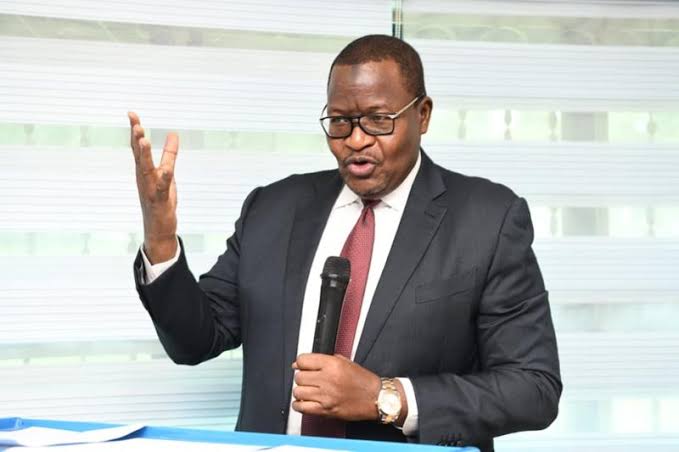Top ICT journalists debated the reserved price of $197.4 million (about N75 billion) published by the Nigerian Communications Commission (NCC) on Wednesday during a panel discussion on the upcoming 5G spectrum license.
On December 13, 2021, a license auction for 5G will be held.
While some agreed with the Mobile Network Operators (MNOs) and their umbrella groups, the Association of Licensed Telecom Operators of Nigeria (ALTON) and the Association of Telecommunications Companies of Nigeria (ATCON), some disagreed, siding with the regulators.
This week’s eBusinessLife forum on GSM@20 and 5G in Lagos featured a panel discussion.
The topic of the panel discussion was “5G: Adoption, Infrastructure, and Service as Critical Elements for a Competitive Digitized Economy” and “5G: Adoption, Infrastructure, and Service as Critical Elements for a Competitive Digitized Economy.”
Mr. Aaron Ukodie, Publisher, eWorldNews; Mr. Emma Okonji, Editor, ICT Desk at ThisDay Newspapers; Mr. Ajibola Olude, Executive Secretary of the Association of Telecommunication Companies of Nigeria (ATCON); and Simileoluwa Oyediji, Chief Project Manager, Digital Encode Limited, who represented the Founder/COO, Digital Encode Limited, Dr. Obadara Pete, were among the panelists.
The reserved bid price, according to Ukodie, was appropriate because it was based on pricing trends in other environments and revenue potentials for licensees.
Operators in some countries spent up to $2 billion for a 5G spectrum license, despite the fact that they were more advanced than Nigeria.
According to him, when the NCC set the reservation price for a GSM spectrum license at $100 million in 2001, three operators eventually decided to pay $285 million apiece to get the license, despite some criticism that the price was too high.
United Networks and MSI Celtel, among those who complained that $100 million was too much at the time and withdrew from the auction, Ukodie stated they regretted their actions. In 2008, Mr. Belo Osagie, the brains behind United Networks, had to team up with Etisalat of the United Arab Emirates to spend $400 million for the license.
Many industry players stated that the Nigerian environment would not create enough money to pay off the cost in gaining the license and implementing a national GSM network and make a profit at the time, as it is now being canvassed on 5G.
Events proved them wrong, as those who took the risk, like as Airtel and MTN at the time, smiled to the bank from the start. Nigeria’s average revenue per user (ARPU), which was $54 in 2003, according to a survey conducted at the time by the International Telecommunications Union (ITU), was the highest in Africa and one of the highest in the world.
Events proved them wrong, as those who took the risk, like as Airtel and MTN at the time, smiled to the bank from the start. Nigeria’s average revenue per user (ARPU), which was $54 in 2003, according to a survey conducted at the time by the International Telecommunications Union (ITU), was the highest in Africa and one of the highest in the world.
ARPU, one of the indices used to assess the performance of GSM operations, is greatest in Nigeria for GSM operators, demonstrating that bettors were correct in their prediction that Nigeria would be a refuge for telecom investors.
The remarkable ARPUs of GSM providers operating in Nigeria were demonstrated by MTN International, which frequently released its findings on its website.
GSM companies in Nigeria are now “reaping the benefits.” According to Ukodie, “the same might be said about 5G.”
In terms of infrastructure, Ukodie believes that InfraCos would be the pillars on which 5G will be spread across the country. “For example, we anticipate them bringing fiber to our houses, public areas, and metropolitan networks in order to provide more seamless signals.” However, the InfraCos’ incapacity to put out services should be investigated.”
He claimed that the Nigerian market is hungry for data, thus the regulator and operators should agree on a bidding price benchmark for 5G implementation.
Okonji believes that the NCC should lower the price of 3.5GHz spectrum in order to entice carriers to bid.
Infrastructure is critical, according to Mr. Emma Okonji. According to him, the telecoms have stated their preparedness to deploy 5G equipment.
He believes that the present price tag of N75 billion will deter carriers from bidding.
On the 5G reserved bid price, Olude concurred with Okonji, claiming that the current pricing of the dollar discourages such large investments in spectrum licenses because “sourcing for dollar is too burdensome.”
He claimed that the current economic situation in Nigeria hinders investments in the telecoms sector, particularly in light of the fluctuating exchange rates.
“We also need to examine the readiness of different State governments, such as at the time GSM was introduced, as they are essential stakeholders in terms of Right of Way and other concerns,” Olude says.
He bemoaned the fact that most state governments have yet to comply to the N145 per linear meter price cap on right-of-way.
“Lagos State charges over N1000 per linear meter for fiber deployment,” he says. There is a charge difference between the mainland and the island (higher rates). As a result, the federal government should reach out to more states to learn why the N145 cap should be kept.
While 5G will enable encryption and other privacy concerns, infrastructure, according to Oyediji, is still important. “The government should intervene and bring things back to normal.” What percentage of the population can afford 5G smartphones, for example? We require them to connect and utilize 5G effectively.
“As a result, service providers must build their own talents as a result of disruptions brought on by innovation.” For deployment, we should not entirely rely on international vendors. Because 5G will power IoT, driverless vehicles, and smart cities, we need to develop local talent.”



